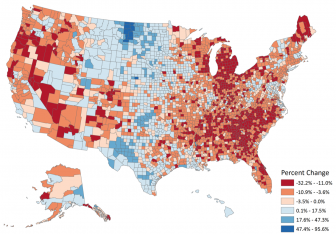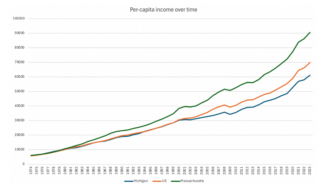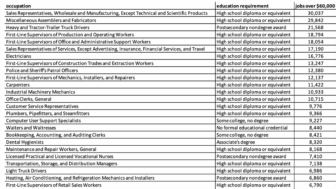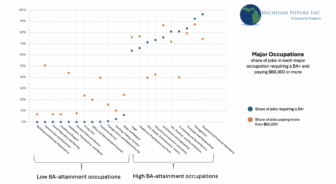Our new report, ![]() A Path to Good-paying Careers for all Michiganders, recommends big changes in state economic policy. The need for such an agenda is clear.
A Path to Good-paying Careers for all Michiganders, recommends big changes in state economic policy. The need for such an agenda is clear.
In the seventh year of a national economic expansion––and an even stronger rebound from near bankruptcy of the domestic auto industry––too many Michigan households are struggling. Michigan’s substantial economic challenges are clearly structural.
In good times and bad far too many Michigan households are experiencing declining or stagnant incomes. Over the last decade and a half––no matter who was in control in Lansing and Washington––Michigan has moved from being a high-prosperity to a low-prosperity state.
Change in real median Household Income by county, 1999-2014
As the map from the Harvard Business School depicts every county in Michigan has suffered a major decline in median household income over the past fifteen years. In terms of per capita income––the best measure of economic well being––Michigan has gone from two percent below the national average in 2000––the last time the domestic auto industry was booming––to eleven percent below in 2015.
Most concerning, the Michigan Association of United Ways found that 40 percent of Michigan households do not have sufficient income to pay for the necessities: primarily housing, childcare, food, health care and transportation. Their report makes clear that this is an all Michigan problem: in every county, among all races and all ages.
Why?
- Not enough of us work: Michigan is 40th in the proportion of adults who work. 400,000 fewer Michiganders working today than in 2000.
- Not enough of us work in good-paying jobs: 16 percent below the national average in wages and benefits per capita. In 2000 Michigan was one percent below.
- Too low education attainment. 32nd in the proportion of adults with a four-year degree or more. And even lower in all the rankings of K-12 student outcomes
More broadly our challenges in Michigan are similar to those Robert Putnam documented in his book, Our Kids: that the top quarter of American households are doing well and the other three quarters are struggling to keep up, many falling farther and farther behind. On measure after measure of economic and social well-being of households and their children Putnam presents charts that look like open scissors with those in the top quartile advancing and those in the bottom three quarters declining.
Once again this pattern is true irrespective of race. Racial discrimination is an ongoing reality in employment, education, housing and the criminal justice system; but class is now the main dividing line in the American economy and increasingly class is defined by college attainment.
The preeminent challenge of our times is figuring out how to reverse what is being called the Great Decoupling. Where even when the economy is growing––as it has been in Michigan since the end of the Great Recession––only those at the top are benefiting from that growth. The policy priority needs to be reestablishing an economy where as the economy grows all Michigan households enjoy rising incomes.








